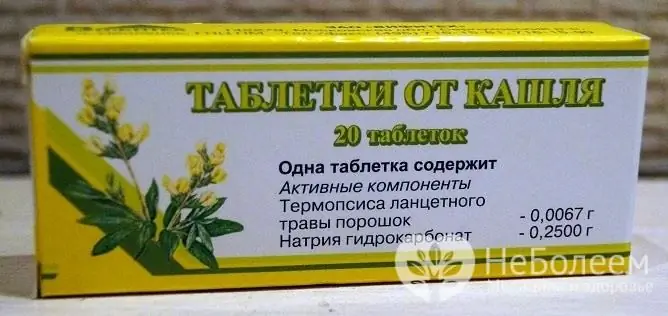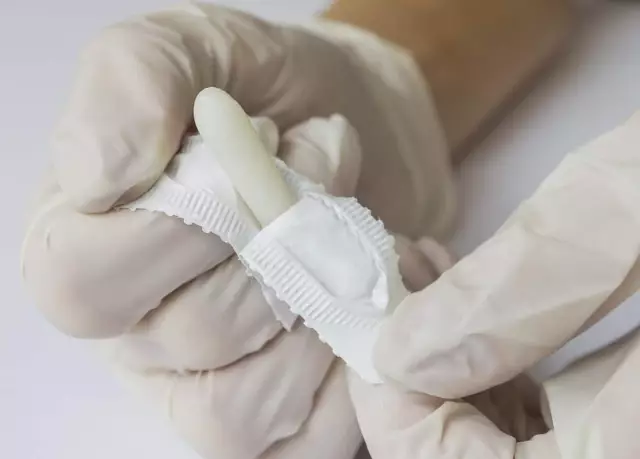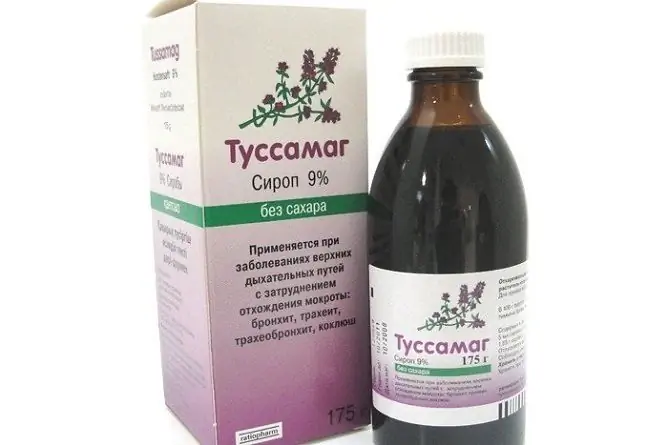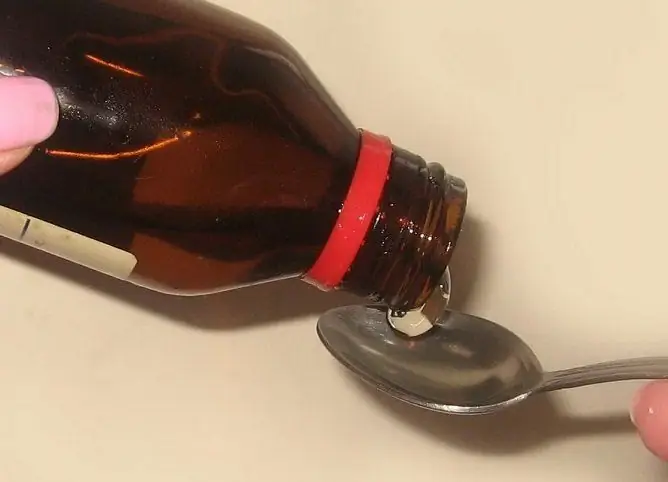- Author Rachel Wainwright wainwright@abchealthonline.com.
- Public 2023-12-15 07:39.
- Last modified 2025-11-02 20:14.
Adult cough tablets: dry and wet cough medicines
The content of the article:
- Choosing a medicine for dry and wet cough
- Cough medicine dosage forms
-
Effective cough suppressants
- Dry cough drugs
- Wet cough drugs
- Cough medicines during pregnancy
- Video
Cough pills are perhaps the most commonly purchased drug in pharmacies. And this is not surprising, because cough is the main symptom of respiratory infections, bronchitis, pneumonia and other diseases of the respiratory system, which are very common. The cough is different - dry, wet, rough, gurgling, dull, barking, harsh. There is no one-size-fits-all best cough remedy that can deal with any kind of cough. In this review, we will briefly review the main inexpensive and effective antitussive drugs, indications and contraindications for their use, and talk about how to choose the right cough medicine.

The attending physician should select medicines for cough
Choosing a medicine for dry and wet cough
Medical treatment of cough is necessarily carried out taking into account its type: dry or wet.
Dry cough is observed with inflammation localized in the upper airways (throat, larynx, trachea). With pharyngitis, it is obsessive, with laryngitis, it is rough and barking, and with tracheitis, it is accompanied by a feeling of rawness behind the sternum. A dry cough is not accompanied by sputum production.
Let's consider the mechanism of dry cough. The inflammatory process causes irritation of the nerve endings located in the mucous membrane of the airways. This irritation is transmitted along nerve fibers to the cough center of the brain. It is here that impulses for a cough push are formed, which is a sharp exhalation through the mouth. During coughing, the mucous membrane is injured, resulting in increased irritation of nerve receptors. A vicious circle is formed.
A dry cough medicine should either calm the inflamed mucous membrane or suppress the activity of the cough center.
With inflammation of the bronchi of medium and small caliber, the patient develops a wet cough. The mechanism of its development is somewhat different. Against the background of inflammation, the secretory activity of the glands located in the mucous membrane of the bronchi increases. In addition, the normal functioning of the ciliated epithelium is disrupted. All this contributes to the stagnation of mucus in the bronchi, an increase in its viscosity.
Treatment of a wet cough should be aimed at removing accumulated sputum from the bronchi. For this purpose, the patient is prescribed sputum thinning (mucolytics) and expectorants.
Thus, all medicines used to treat cough are divided into two large groups:
- "From cough". They have a suppressive effect on various links in the pathological mechanism of dry cough attacks. These include, for example, absorbable mint tablets, which reduce irritation of the inflamed mucous membrane, or centrally acting drugs that inhibit the activity of the cough center.
- "For a cough." The action of drugs in this group is aimed at diluting sputum and accelerating its excretion from the bronchi. The list of drugs "for cough" is quite extensive, all of them in one situation or another help against wet cough, that is, stimulate the excretion of sputum.
Cough medicine dosage forms
Currently, cough medicines are available in the following dosage forms:
- drops - a small volume of solution contains high concentrations of active substances;
- elixir or syrup - the active ingredient is dissolved in sugar syrup (this is the most convenient form for treating children);
- lozenges, lozenges, effervescent tablets, or lozenges - indicated for suppressing attacks of dry cough;
- capsules or tablets - the dosage form most often prescribed for adult patients;
- ointment - used as an irritating and distracting external agent, which contributes to the reflex improvement of blood circulation in the respiratory system.
The main advantages of using tablets are:
- compactness of the package, which allows the drug to be used not only at home, but also at work, on the road, traveling;
- tablets do not need to be accurately measured (like syrup) or diluted (like drops);
- the tablets will not spill or stain your bag or clothes.
Tablets are often available in paper packaging. For ease of use, you can transfer them to a special pill box.
Effective cough suppressants
It has already been said above that all drugs used to treat cough are divided into two large groups. Let's consider each of them separately.
Dry cough drugs
The main action of this group is to suppress attacks of dry, unproductive cough. What's a good tool to do this most effectively? It must have the following properties:
- provide a quick healing effect;
- have a sufficient duration of action.
Depending on the operating mechanism, antitussive tablets are divided into drugs of central and peripheral action.
Medicines belonging to the central action group block the cough by inhibiting the cough center. These include:
- Narcotic analgesics (Ethylmorphine, Codeine). These are very powerful remedies that are only sold with a doctor's prescription. Their disadvantage is that they suppress the activity of not only the cough, but also the respiratory center, cause the formation of drug addiction.
- Non-narcotic antitussives (Pentoxiverin, Oxeladin, Glaucin, Butamirate). They have a selective (selective) effect on the cough center. These drugs, which are not addictive and do not suppress the activity of the respiratory center, are most often used for dry coughs.
Antitussive drugs of peripheral action reduce the irritability of the nerve receptors of the mucous membrane of the airways, thereby preventing the flow of impulses to the cerebral cortex. They have an enveloping, softening or soothing effect.
Wet cough drugs
In the treatment of wet cough, drugs are used that create optimal conditions for the removal of secretions from the lower respiratory tract. These drugs are divided into the following groups:
- Mucolytics (Chymotrypsin, Trypsin, Carbocisteine, Acetylcysteine, Ambrobene, Bromhexine). They contribute to the transition of sputum into a more liquid state, making it much easier to pass during a cough.
- Expectorants. Medicines in this group stimulate the expectoration (discharge) of phlegm. They can include both natural (thyme, licorice or marshmallow root, thermopsis herb) and synthetic (sodium bicarbonate) components. Answering the question of what to drink with a wet cough, it should be emphasized that monotherapy with expectorant drugs is permissible only with sufficiently liquid sputum. Otherwise, the doctor simultaneously prescribes mucolytics and expectorants to the patient.
- Combined drugs. They are based on several components at once, which act on different links of the pathological mechanism of wet cough. For example, they liquefy phlegm, improve its expectoration, and eliminate bronchospasm. Combination cough medicines may be herbal only or contain synthetic ingredients. The combination of several active substances in one tablet at once increases its effectiveness, and in addition, it is very convenient for patients, because they do not need to remember how to take several cough medicines at once, study many annotations, remember what should be taken before and what after meals.
Cough drugs are one of the most numerous pharmacological groups, the list of their names will take more than one page. Each of them has its own indications, contraindications and side effects. In addition, it should be understood that a cough can be a sign of a rather serious illness, for example, pneumonia. Therefore, before you buy this or that drug at a pharmacy, you need to consult a doctor. If this is not possible, then you should carefully read the instructions for use and choose pills that match the type of cough (dry or wet).

The drug "Cough pills" can cause spontaneous abortion in the early stages
In no case should you take with a wet cough drugs intended to relieve dry cough, as they will suppress coughing attacks and thereby retain phlegm in the bronchi, which will contribute to the development of complications (obstructive syndrome, pneumonia).
Cough medicines during pregnancy
During pregnancy, it is strongly discouraged to self-medicate, to "prescribe" antitussive drugs to yourself, guided by the reviews of relatives and friends. Only a doctor can choose the right course of treatment, determine the remedy necessary in this particular case, explain when and how to take it. Even drugs that seem at first glance absolutely harmless should be taken exclusively as directed by a doctor. For example, the usual "Cough pills", which contain soda and thermopsis herb, can cause an increase in uterine tone and premature termination of pregnancy.
When prescribing antitussive drugs to pregnant women, therapists and gynecologists must take into account the gestational age. So, in the first trimester of pregnancy, marshmallow root syrup or Mukaltin is usually prescribed. These drugs do not adversely affect the course of pregnancy and fetal development.
Other herbal antitussives may also be prescribed, for example, Bronchicum, Dr. Mom. With a strong dry cough in a short course and in a minimum dosage, it is permissible to use Libeksin, provided that the intended benefits of its appointment significantly outweigh the potential risk of possible complications.
In the II-III trimesters, due to the development of the placenta, the list of approved drugs is expanding, women can be prescribed marshmallow root syrup, Mukaltin, Falimint, Linkas, Ambrobene.
Video
We offer for viewing a video on the topic of the article.

Elena Minkina Doctor anesthesiologist-resuscitator About the author
Education: graduated from the Tashkent State Medical Institute, specializing in general medicine in 1991. Repeatedly passed refresher courses.
Work experience: anesthesiologist-resuscitator of the city maternity complex, resuscitator of the hemodialysis department.
Found a mistake in the text? Select it and press Ctrl + Enter.






